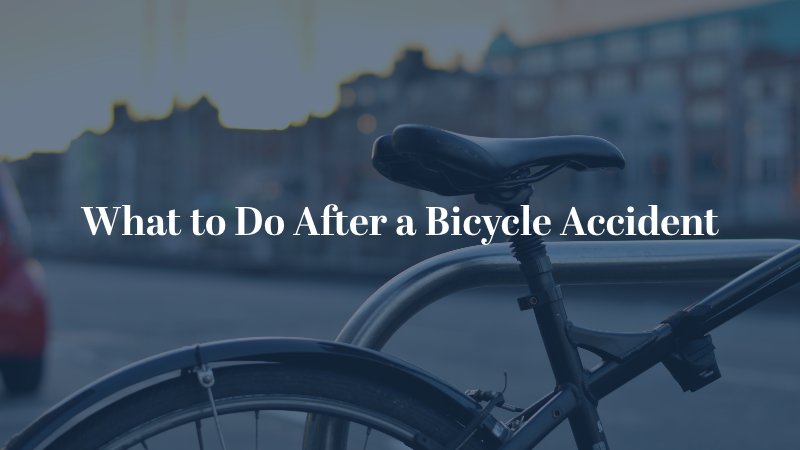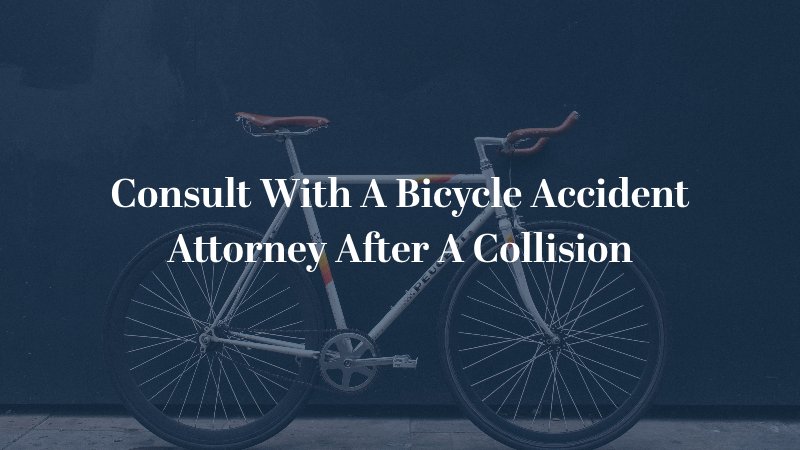If you’ve been injured in a bicycle accident, it’s important that you know the steps to take so you can protect your rights and take care of your health. Though these types of accidents are common, the aftermath can be overwhelming—especially if you or someone close to you is seriously injured. Here’s an overview of what to do after a bicycle accident.

Stay Calm and Move Out of Traffic
The first thing to do after any accident is stay as calm as possible. This is especially true if you are on the side of the road or in a busy area with speeding cars. You need to make sure you are safe from further injury. If it is safe to do so, move off the road and out of traffic before attempting any other action. If there are bystanders who have stopped at the scene, ask them for help in moving out of harm’s way.
Assess Your Physical Condition and Seek Medical Attention
The first thing that you should do after any bicycle accident is evaluate your physical condition and seek medical attention if needed. Even if you don’t think that anything is wrong, it’s still important to get checked out by a doctor just in case there are any unseen injuries.
Seeing a doctor right away will ensure that your health is taken care of, as well as provide vital documentation for potential legal action down the road.
Contact The Police And File A Report
Once everyone involved in the accident is safe, contact law enforcement immediately so they can document all pertinent information from the scene. Be sure to provide as many details as possible when speaking with officers—including information about any drivers involved in the incident, witnesses who may have seen what happened, etc.—so they can accurately file their report.
When you file a police report after a bicycle accident, it serves as proof of the accident’s occurrence should there be any dispute down the line. The report also serves as evidence if there was any property damage or injuries sustained during the incident or if another party is found liable for any damages caused by the accident. This means having an official record to refer back to when filing insurance claims or taking legal action.
A police report can also help determine liability in cases where someone else may be responsible for causing an accident involving your bicycle or resulting injuries sustained due to their negligence or recklessness on the roadways leading up to its occurrence.
The police report will detail witness statements and other vital information that may help establish who was at fault for causing such an incident which ultimately helps determine whether legal action needs to be taken against another party or not.
Exchange Information with the Involved Parties
You should always exchange information with the other involved parties. This includes obtaining their contact details, insurance information, and vehicle registration information.
It is also important that you collect witness contact information if possible. Documenting as much detail as possible right away will help ensure that any potential claims are accurately addressed going forward.
Document the Accident Scene
In addition to collecting contact information from those involved in the accident, it is also important that you document the scene of the accident itself. Take photographs of both the site of the accident and any damages or injuries sustained in order to preserve evidence for your case. You should also write down your own personal account of what happened during and leading up to the crash so that you can review it later if necessary.
Additionally, make sure that you keep track of any medical treatment or expenses resulting from the crash; these costs may be recoverable when you decide to file an insurance claim or personal injury claim.
Don’t Admit Fault
In some cases, drivers may try to push blame onto cyclists for causing an accident even when it was actually their fault; don’t fall into this trap. Even if you think something you did might have played a role in causing an accident (for example, running a red light), don’t admit fault. Always speak with a lawyer before giving a statement to an insurance adjuster, as saying the wrong thing could cost you down the road.
Preserve Your Bicycle and Other Damaged Property
It is essential that you preserve all evidence related to your bicycle accident case. This includes not only photographic and written records but also physical evidence such as any damaged property or clothing worn at the time of the crash.
Make sure that nothing is repaired or altered until after consulting an attorney—any changes made prior could potentially jeopardize your case later on down the line.
Stay Off Social Media And Avoid Discussing The Accident
This one may seem like common sense, but it cannot be overstated: stay off social media and avoid discussing anything related to the accident online until after consulting with an experienced attorney who specializes in bicycle accidents (and preferably until after finalizing any settlements or until trial is concluded).
Anything posted on social media sites like Facebook, Twitter, or Instagram could potentially be used against you during settlement negotiations or at trial. Therefore, exercising discretion here is essential for protecting yourself legally moving forward, no matter how innocent or innocuous you think your posts are.

Consult With An Experienced Bicycle Accident Attorney
One of the most important steps you can take is to consult with an experienced bicycle accident lawyer in Washington, D.C. who specializes in bicycle accidents. A knowledgeable lawyer will understand your legal rights and be familiar with what compensation may be available in your specific case.
An attorney can also help guide you through any complicated paperwork that may arise during this process and provide advice on how best navigate settlement negotiations with an insurance adjuster or opposing counsel—including whether settling a case out of court might be the best option given the circumstances.
Navigating a bike accident can be daunting but following these key steps can help ensure that you receive the help you need and deserve. For further assistance, contact us to schedule a free consultation.